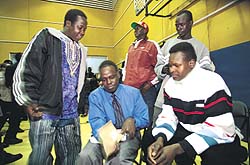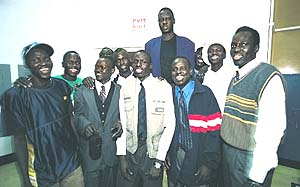 |
 |
| current issue |  |
past issues |  |
send a letter/news |  |
address update |  |
advertise |  |
about us |  |
alumni home |
Features
Lost and FoundPage 3 of 4
The animal science department had organized a buffet luncheon, demonstrations of milking and research projects, and small-group tours. Thompson School Associate Professor Drew Conroy prepared chai for them, spoke to them in Swahili, and talked about Dinkas with whom he has worked in Africa.
For these young men, coming from a land without electricity, telephones or motors, watching the demonstrations of computerized milking machines was "like science fiction," Chanoff observes. When Erickson showed them the scientifically blended feed given to the UNH Holsteins, one of the young men said, "We ate this every day--cornmeal and a cup of water."
 A trip to Boston to hear Manute Bol provides John Akok with a chance to reconnect with friends and get mail that they had been saving for him. |
After that visit, Erickson was determined to bring some of the Lost Boys to UNH. "It is remarkable to me to see these guys, who have been to hell and back many times, with such positive attitudes," he says. "After all they have been through, they are thankful for what they had. They could be angry, resentful. But they appreciate everything that is given to them. They thank God every day." Kelly Giraud had just arrived at UNH as a new assistant professor of resource economics and development when she saw a report on the Lost Boys of Sudan on NBC's "Dateline" on Sept. 9, 2001. "It was just my second week here," she recalls, "and the story just grabbed me." Giraud had been given some tuition waivers for graduate students to assist with her research, and she asked permission to use part of that money for tuition costs for some of the Lost Boys. Andrew Rosenberg, dean of the College of Life Sciences and Agriculture, not only granted that request, he suggested she get Erickson to help her to line up some potential students.
Erickson and Giraud made several trips to Boston to speak with groups of Sudanese refugees about opportunities at UNH. Erickson's church, the First Congregational Church of Farmington, donated coats and money for books. Tom Fairchild, a professor of animal and nutritional sciences, gathered used computers to send to Boston. Jibril Salaam, associate director of admissions, helped Giraud to guide candidates through the admissions process.
Adjusting to the American education system wasn't easy for Akok and Ajou, but with one semester behind them, they are confident that they will succeed at UNH. Before arriving on campus, neither of them had touched a computer. Giraud found two used computers for them in November, and they quickly become adept at e-mail and searching the Web. Akok was excited to discover the wealth of information about Dinka culture available on the Web, which helped him to write papers for his anthropology class. He was amazed at how much time it takes to research, compose and type a paper.
 Former NBA star Manute Bol, center, meets with fellow countrymen Akok, Ajou and other Lost Boys in Boston. |
Justus Ogembo, assistant professor of anthropology and education, has Akok in his course, Introduction to Race, Culture and Power, and is impressed by his writing ability. "I thought they would have some language problems, but John writes very well," he says. "His British style is precise and to the point." Near the end of the semester, with a couple of papers still to be graded, Akok had an A average for the course, placing him easily among the top five students in the 38-student class.
"The essence of humanity" is how Ogembo describes the university's support for the Sudanese students. Educating young people like Akok and Ajou has a great and positive influence in the world, he says. Everyone learns in this situation--not only Akok and Ajou, but their classmates as well. When Akok speaks in class, Ogembo remembers why diversity in the classroom is important: so everyone can share different ways of experiencing the world.
The academic demands of college life were not the only challenges facing the two Sudanese students. "Living in a dorm with girls--that's different!" Akok observes with a shy grin. Cultural differences in gender roles and interaction are a big topic of discussion and good-natured joking on their floor in Devine Hall, which is reserved for students with a particular interest in other cultures. Akok and Ajou have made friends on the floor and enjoy learning about other students' backgrounds. Samantha Burns '06, perhaps their best friend, helps them with their computer skills and occasionally types a paper for them. "Our RA (resident assistant), Lourdes Genao, is a wonderful person!" says Akok. Genao, a junior who came to this country from the Dominican Republic when she was 11, says that she was initially concerned that the two Sudanese freshmen might be too shy to fit in. "They were so quiet I thought they might just keep to themselves," she recalls. But as the semester progressed, she saw Akok and Ajou talking to other students on the floor and going out for meals with some of them. "We have a great support system here," she says of UNH's efforts to welcome and retain students from minority backgrounds.
Page: < Prev 1 2 3 4 Next >Easy to print version

